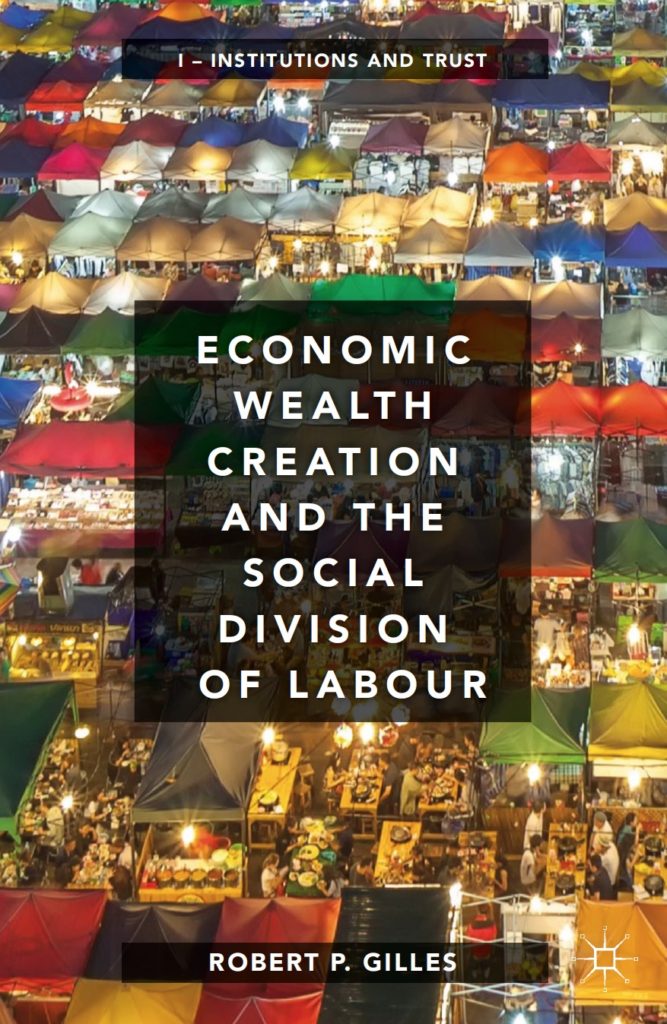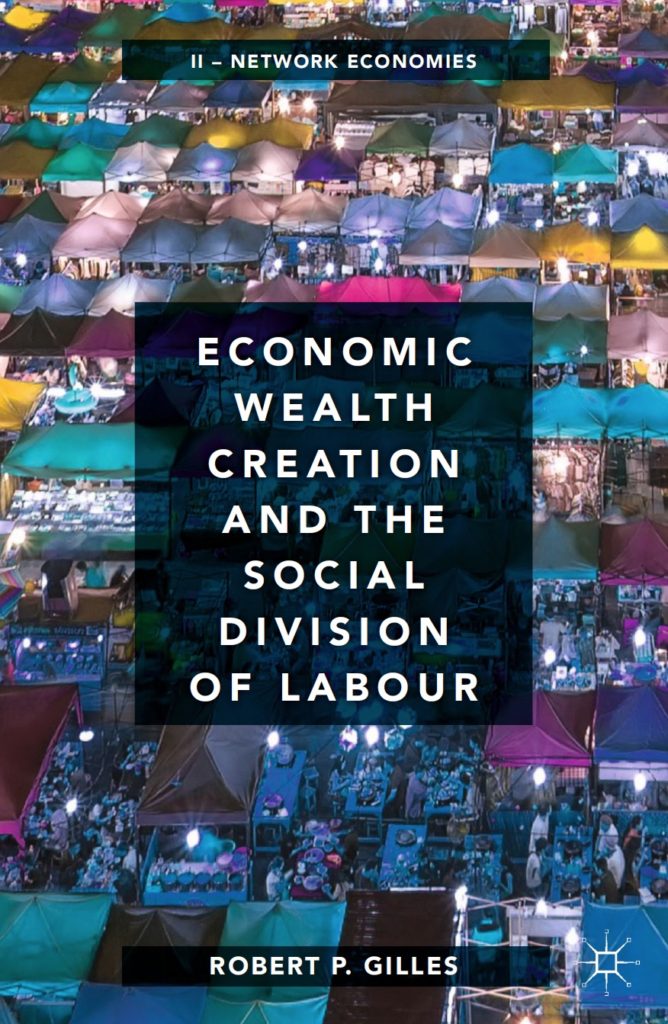This page contains working papers and recently published work on the theory of economies with an endogenously forming social division of labour.
The Core of Economies with Collective Goods and a Social Division of Labor
by Achille Basile, Robert P. Gilles, Maria Gabriella Graziano and Marialaura Pesce
October 2019; Revised January 2020
Abstract:
This paper considers the Core of a competitive market economy with private commodities as well as (non-Samuelsonian) collective goods that are provided through an endogenous social division of labour. Our approach is founded on the hypothesis that every agent is a “consumer-producer”-producing private commodities as well as consuming collective and private goods. We develop the 𝞂-core concept, assuming that collective goods are scalable with community size.
We show that the 𝞂-core can be founded on deviations of coalitions of arbitrary size, extending the seminal insights of Vind and Schmeidler for pure exchange economies. Our analysis also shows that self-organisation in a social division of labour can be incorporated into the Edgeworthian barter process directly. This is formulated as an equivalence of the 𝞂-core and a structured 𝞂-core concept based on blocking coalitions that use internal divisions of labour. Furthermore, Grodal’s theorem is extended, allowing applications of metrics that express productive similarities between agents making up blocking coalitions.
Finally, we consider the equivalence of the 𝞂-core and the set of cost share equilibrium allocations.
Published in Economic Theory (March 2021)
Previous version: CSEF Working Paper #544
The Provision of Collective Goods through a Social Division of Labour
by Robert P. Gilles, Marialaura Pesce and Dimitrios Diamantaras
March 2019; Revised: December 2019
Abstract:
We develop a general equilibrium framework in which a wide range of collective economic configurations are provided through specialised professionals as part of an endogenously emerging social division of labour. We extend the theory of value to this setting bringing together a model of an economy with collective goods with the model of a private-goods market economy with an endogenously emerging social division of labour. Natural applications are the presence of non-tradables in production, the effects of education on productive abilities, and the market system itself as an implementation of the price mechanism.
For an appropriately generalised notion of valuation equilibrium, we prove the two fundamental theorems of welfare economics under very general conditions, notably allowing for incomplete, non-monotonic, and non-transitive preferences. We also incorporate Adam Smith’s principle of increasing returns to specialisation and establish that there emerge well-structured social divisions of labour in equilibrium.
Published in the Journal of Economic Behavior and Organization
Alternative source: CSEF working paper #469
Economic Wealth Creation and the Social Division of labour
(in two volumes)
by Robert P. Gilles

Volume I: Institutions and Trust
Abstract:
This textbook introduces and develops new tools to understand the recent economic crisis and how desirable economic policies can be adopted. Gilles provides new institutional concepts for wealth creation, such as network economies, which are based on the social division of labour. This volume investigates the formation of networks and hierarchical authority organisations, with a focus on the role of trust. Gilles also looks at the theory of growth and development, using real world examples and problem sets to put into practice. This title is suitable reading for undergraduate, MSc and postgraduate students in microeconomic analysis, economic theory and political economy.

Volume II: Network Economies
Endorsement:
‘This is the second book of a two-volume set that continues Adam Smith’s work, using the tools mathematical, experimental, and behavioural economists have developed since 1776. As in the first volume, markets are not the central organising principle. Instead, attention centres on social institutions and the division of labour that they enable. The book studies this via the endogenous division of labour that existing institutions help form. The first book in the series examined this problem deeply, resorting minimally to formal mathematical modelling; the second volume is where the formal modelling blossoms. General equilibrium theory meets network theory and receives a breath of fresh air, including a new viewpoint on economic inequality, the newly resurgent bane of capitalism. What I said for the first volume applies to this second volume equally: if you care to understand the economy, this book belongs to your bookshelf.’
—Dimitrios Diamantaras, Temple University, Philadelphia, USA
Abstract:
This textbook introduces and develops new tools to understand the recent economic crisis and how desirable economic policies can be adopted. Gilles provides new institutional concepts for wealth creation, such as network economies, which are based on the social division of labour.This second volume introduces mathematical theories of the endogenous formation of social divisions of labour through which economic wealth is created. Gilles also investigates the causes of inequality in the social division of labour under imperfectly competitive conditions. These theories frame a comprehensive, innovative and consistent perspective on the functioning of the twenty-first century global economy, explaining many of its failings. Suitable reading for advanced undergraduate, MSc and postgraduate students in microeconomic analysis, economic theory and political economy.
Market Economies with an Endogenous Social Division of Labour
by Robert P. Gilles
September 2018
Abstract:
This paper considers a general equilibrium model of a competitive market economy in which production is conducted through an endogenous social division of labour. We represent economic decision makers as “consumer-producers”, who consume as well as produce commodities. In this approach, the emergence of a non-trivial social division of labour is guided by Increasing Returns to Specialisation in production.
This paper investigates the properties of equilibria in economies satisfying Increasing Returns to Specialisation. We show that a perfectly competitive price mechanism induces a dichotomy of production and consumption at the level of the individual consumer-producer. In this context, under Increasing Returns to Specialisation, we show existence of competitive equilibria, the two fundamental theorems of welfare economics, and characterise these equilibria. Under certain conditions, markets are equilibrated through the adjustment of the social division of labour; therefore, prices are objectively determined by the production technologies on the supply side of the economy only.
Published in the International Economic Review (May 2019).
The Core of an Economy with an Endogenous Social Division of Labour
by Robert P. Gilles
September 2018
Abstract:
This paper considers the core of a competitive market economy with an endogenous social division of labour. The theory is founded on the notion of a “consumer-producer”, who consumes as well as produces commodities. First, we show that the Core of such an economy with an endogenous social division of labour can be founded on deviations of coalitions of arbitrary size, extending the seminal insights of Vind and Schmeidler for pure exchange economies. Furthermore, we establish the equivalence between the Core and the set of competitive equilibria for continuum economies with an endogenous social division of labour.
Our analysis also concludes that self-organisation in a social division of labour can be incorporated into the Edgeworthian barter process directly. This is formulated as a Core equivalence result stated for a Structured Core concept based on renegotiations among fully specialised economic agents, i.e., coalitions that use only fully developed internal divisions of labour.
Our approach bridges the gap between standard economies with social production and coalition production economies. Therefore, a more straightforward and natural interpretation of coalitional improvement and the Core can be developed than for coalition production economies.
Published online: arXiv version of this paper – arXiv:1809.01470
Stability in a Network Economy: The Role of Institutions
by Robert P. Gilles, Emiliya A. Lazarova and Pieter H.M. Ruys
April 2015
Abstract:
We consider an economy in which agents are embedded in a network of potential value-generating relationships. Agents are assumed to be able to participate in three types of economic interactions: Autarkic self-provision; bilateral interaction; and multilateral collaboration.
We introduce two stability concepts and provide sufficient and necessary conditions on the network structure that guarantee existence, in cases of the absence of externalities, link-based externalities and crowding externalities. We show that institutional arrangements based on socioeconomic roles and leadership guarantee stability. In particular, the stability of more complex economic outcomes requires more strict and complex institutional rules to govern economic interactions. We investigate strict social hierarchies, tiered leadership structures and global market places.
Published in the Journal of Economic Behavior and Organization (November 2015).
Globalisation and Inequality: A Yangian General Equilibrium Analysis
by Robert P. Gilles
March 2015
Abstract:
Inequality has become a much debated issue in the ongoing assessment of the performance of the contemporary post-crisis global economy. In this paper I present a Yangian general equilibrium approach that shows that global trade institutions might result in significantly higher welfare inequality than an organic matching economy based on an endogenous social division of labour. Global markets enhance the effects of social scarcity of the most preferred commodity, thus increasing the welfare of its primary producers over the agents producing the less socially scarce commodity. A detailed analysis is presented to identify the institutional features that cause this opportunity inequality.